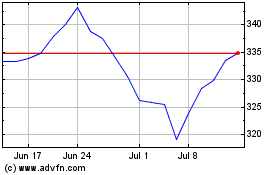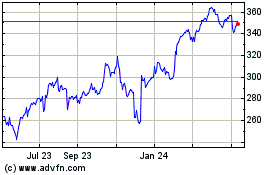Aetna, Anthem Defend Insurance Deals
September 22 2015 - 12:50PM
Dow Jones News
The chief executives of Aetna Inc. and Anthem Inc. defended
their planned deals before a Senate subcommittee, facing sharply
critical testimony that raised questions about the impact of
health-insurance consolidation.
Aetna is seeking to acquire Humana Inc., in a $34 billion
transaction focused largely on the private Medicare plans known as
Medicare Advantage. Anthem is aiming to take over Cigna Corp. in a
$48 billion deal. The two mergers together would have the effect of
shrinking the top five health insurers to a big three, each with
annual revenue of more than $100 billion. The third player would be
UnitedHealth Group Inc.
In their own testimony before the Senate Judiciary antitrust
subcommittee, Mark T. Bertolini of Aetna and Joseph R. Swedish of
Anthem emphasized that health care is delivered largely on a local
basis, and they argued markets would remain competitive if their
deals closed. Both also said their deals would benefit consumers
and encourage new forms of payment to health-care providers.
Mr. Bertolini said only 8% of Medicare beneficiaries would get
coverage from the combined Aetna-Humana and "robust competition
will remain in the Medicare market." Mr. Swedish said Anthem and
Cigna had "very limited and in most cases no market overlap."
But other witnesses were skeptical about the benefits of the
deals. Leemore Dafny, a professor at Northwestern University's
Kellogg School of Management, said consumers are "paying a premium
on our premium" because of lack of competition among insurers.
Richard J. Pollack, the chief executive of the American Hospital
Association, said the group was concerned the insurance deals would
lead to fewer choices and higher costs for consumers.
Sen. Al Franken of Minnesota, a Democrat, grilled the two
insurance CEOs on whether they would commit to passing along the
savings their deals achieve to consumers, asking repeatedly for a
pledge. After the question was repeated three times, Mr. Bertolini
said the "savings will be passed along in the price of our
products." Mr. Swedish also promised savings. But Sen. Franken
noted that he ran out of time to continue, and said, "We could have
gone quicker if those answers were yes."
Quizzed about rules tied to its status as a Blue Cross and Blue
Shield license holder, Mr. Swedish said that the combined company
would maintain the Cigna brand in competing for national employer
business, and in markets other than the 14 states where it is a
Blue plan. The deal "would in fact make the Cigna brand stronger
nationally," he said.
Mr. Pollack of the hospital association argued the Cigna deal
would "add to Blue dominance." Ms. Dafny said Anthem and Cigna
would be "the same entity" and she didn't "see how that would be
competition."
Sen. Amy Klobuchar, a Minnesota Democrat, asked the two CEOs to
explain "why you have to have these mergers to get to where you
want to be?" Aetna's Mr. Bertolini acknowledged that his company
could eventually reach its goals without the merger, but said it
would take years longer. Mr. Swedish emphasized the cost savings
and synergies his deal would bring.
Sen. Orrin Hatch (R., Utah) asked about statistical data showing
the insurance markets would be more concentrated after the merger.
Mr. Bertolini said market concentration was just one measure. As he
looked at markets where Aetna and Humana compete, "we see plenty of
competition, we see plenty of entrants," he said.
Write to Anna Wilde Mathews at anna.mathews@wsj.com and Brent
Kendall at brent.kendall@wsj.com
Subscribe to WSJ: http://online.wsj.com?mod=djnwires
(END) Dow Jones Newswires
September 22, 2015 12:35 ET (16:35 GMT)
Copyright (c) 2015 Dow Jones & Company, Inc.
Cigna (NYSE:CI)
Historical Stock Chart
From Mar 2024 to Apr 2024

Cigna (NYSE:CI)
Historical Stock Chart
From Apr 2023 to Apr 2024
